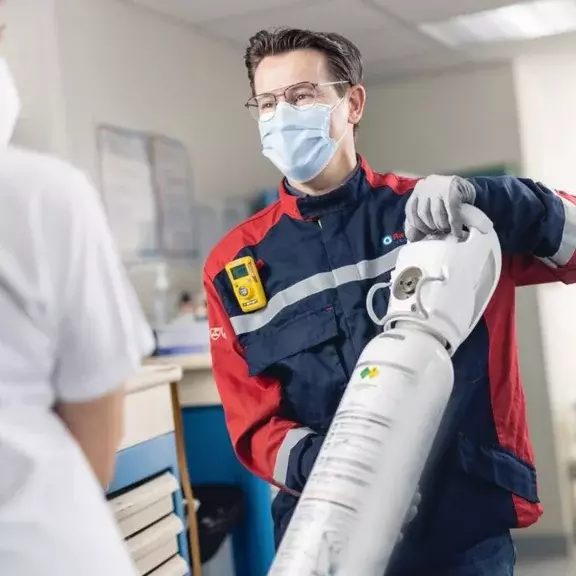Air Liquide Healthcare: an approach based on value in healthcare
Increase in chronic diseases, aging population, pandemic risks, fragile funding: healthcare systems have to respond to growing needs, while guaranteeing their economic sustainability.
At Air Liquide Healthcare, we have a privileged position to help meet this double challenge and become a key innovative partner for the transformation of Healthcare. To support this ambition, our strategy is to deliver more value in healthcare, for patients, healthcare professionals and the system as a whole.
Transforming healthcare: better outcomes for a sustainable healthcare system
By listening to and understanding the needs of patients and healthcare professionals, we progressively shifted from supplying products or medical devices toward supplying a range of services. These days, we are convinced that an approach based on value is the only way to meet the current challenges of the healthcare system and ensure its sustainability.
That's why, over 30 countries around the world, we are working alongside all healthcare players to meet the major challenges they face. As a long-standing partner of healthcare teams and a healthcare player in patients' homes, Air Liquide Healthcare works closely with physicians and health authorities.
Both at the hospital and at home, in person or remotely, in times of calm or crisis, in large cities or in medical deserts, we work for the benefit of the patient by placing them at the heart of everything we do, with the ambition of being useful to the community.
That's how we are helping to change healthcare, with you. Our corporate signature "Changing care. With you." is the expression of this vision.
What is value definition in healthcare?
It's an approach developed by Professors Michael E. Porter and Elizabeth O. Teisberg and described in the book Redefining Health Care. Value in healthcare is defined as the benefits that matter to the patient, relative to the costs of achieving those benefits. Value can be increased either by improving health outcomes for the patient, or by achieving the same health outcomes but with a lower cost of care. The authors support the idea that it is necessary to put the patient at the heart of his or her care pathway, and to focus on health measured from the patient's point of view. Indeed, the objective of all medical care is health, not treatment!
What does value mean in healthcare? What are the pillars of value-based healthcare?
Putting the patient at the heart of all medical decisions means defining PREMs (Patient-Reported Experience Measures) and PROMs (Patient-Reported Outcome Measures) for each pathology, and collecting them for each patient. If we take the example of sleep apnea, PREMs cover the delay in diagnosis, the competence and attentiveness of the teams, etc., while PROMs measure sleepiness, the ability to drive or work, and so on. These measures, which assess quality of life, complement the clinical results linked to the disease (e.g. number of apneas per night).
The use of patient-reported data will enable us to improve care. To this end, ICHOM, the International Consortium for Health Outcomes Measurement, is working to facilitate the adoption of value principles in healthcare. Air Liquide Healthcare had the opportunity to share its vision of health value applied to its home healthcare business: discover the interview “Air Liquide Healthcare is committed to educate, empower and support patients at home all along their care pathway, measure which outcomes matter to them and adapt the care for better health results.”
Our difference: the value in healthcare
At Air Liquide Healthcare, we are convinced that the value approach is the only one capable of meeting the current challenges facing healthcare systems and ensuring their sustainability. Our patient-centered approach is at the heart of our action for more value in healthcare and aims to improve patient outcomes at the best cost to society, thus contributing to a more efficient and virtuous system.
Home healthcare services
Every day, we provide personalized care for people living with chronic diseases, right in their homes. Our aim is to ease the adherence to therapy over the long term and to improve their quality of life.
Medical gases and associated services
Every day, we guarantee the availability, reliability and safety of medical gases supply and its associated services in hospitals and care facilities. In this way, we play an essential role by helping caregivers in their everyday work and enable them to fully devote themselves to patient care.
Value-based practice: emblematic example of value in healthcare
The Martini-Klinik is a private clinic specializing in the treatment of prostate cancer patients in Germany and its 5-year survival rate is very similar to that of other clinics in Germany (95% vs. 94% respectively) in the treatment of this pathology. Let's turn now to PROMs, measures of health outcomes that matter to the patient, such as incontinence or erectile dysfunction. Differences are widening between facilities. These two indicators have a major impact on patients' quality of life, and are not systematically taken into account when assessing quality of care. Discover the case study.
Better relevance of care for a sustainable health system
The value approach to healthcare is also shaking up the remuneration model for health systems. Suppliers of medical devices, drugs and services involved in the value-based healthcare approach are calling to be evaluated and remunerated on the basis of the results obtained for the patient and his or her health outcomes, rather than on the basis of the quantity of products and resources implemented. This approach would make it easier to evaluate the relevance of care, and thus achieve better outcomes for patients at a controlled cost to health systems.
Let's take Diabeter as an example, a Dutch clinic network specialized in the treatment of type 1 diabetes in children and young adults. This network has set up integrated practice units: in a modern and non-hospital environment, these units are patient-centered, providing expert support 24/7. The results achieved by Diabeter in terms of clinical outcomes are exemplary. By improving the HbA1c levels of patients living with type 1 diabetes, Diabeter has a lower hospitalization rate than other Dutch clinics specializing in pediatric diabetes, with a corresponding impact on the cost of care. This is essential to support a sustainable care model.
Why adopt a value based care? Supporting the four major transformations in Healthcare
Patients are changing
Patients want to be involved in decisions that concern them, they want to understand the advantages and disadvantages of any given treatment, to receive therapeutic education, and to receive support to help them become more autonomous. They want to be able to interact easily with healthcare providers, to have access to their healthcare data, and to enjoy digital solutions that make their lives easier.
Beyond being actively involved in their treatment, they want to be seen as a human being. They are not defined by their disease; it is just one aspect of their identity.
The location of care and healthcare professionals’ practices are changing
Health crises are putting even greater pressure on healthcare systems and accelerating the emergence of novel approaches such as digital healthcare and out-of-hospital care. While hospitals are becoming high-added-value centers of expertise for acute care, we are stepping up our cooperation with them to ensure that home healthcare is more widely and more systematically chosen for certain conditions when appropriate.
Simultaneously, new places of care are being created: nursing homes, therapeutic apartments, etc. The care pathway is becoming increasingly complex, and coordination is necessary.
Data and digital technologies in healthcare are creating new opportunities
Sharing healthcare data enables us to customize care plans to provide the outcomes that are most important for patients. Beyond the use of data in the context of curative care, data analysis enables us to evaluate the risk of non-compliance and thereby provide customized support for specific patients on a preventive basis.. Interactions between patients and healthcare professionals are quicker and easier, which reliably improves patient outcomes.
Healthcare systems and payers’ role are changing
More and more people are arguing for a move toward value-based healthcare. Two ways to effect this change have been identified: the reduction of avoidable healthcare spending and the consolidation of medical/economic data on products and services throughout their life cycle.









